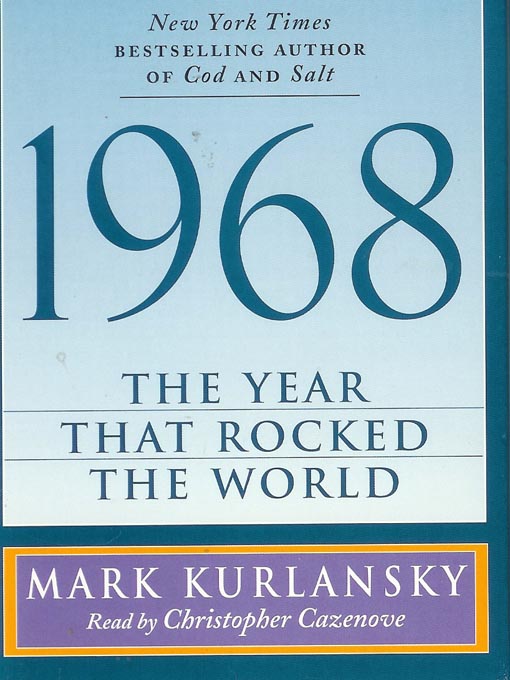In many ways, this momentous year led us to where we are today. Covering popular culture, politics, war, economics, and the media, Mark Kurlansky shows how twelve volatile months transformed who we were as a people. But above all, he offers provocative insights into the underlying causes of the historical phenomenon that was the year 1968.
-
Creators
-
Publisher
-
Release date
March 1, 2004 -
Formats
-
OverDrive Listen audiobook
- ISBN: 9781597772808
- File size: 468680 KB
- Duration: 16:16:24
-
-
Languages
- English
-
Reviews
-
AudioFile Magazine
The assassinations of Martin Luther King, Jr., and Bobby Kennedy; riots at the Democratic National Convention; Prague Spring; the antiwar movement and the Tet Offensive; Black Power; women's liberation; and student uprisings from Warsaw to Berkeley. Mark Kurlansky can be forgiven for saying that the momentous events of 1968 transformed us and gave us the world in which we live today. His book on the subject is absorbing, whether you agree or disagree with his thesis. English actor Christopher Cazenove reads with evident interest, and just enough verve to emphasize the excitement of events without overdramatizing. He highlights the repetitive rhythm of Kurlansky's writing in a way that makes it easy to listen to, not metronomic. Even his occasional British pronunciation of an American name is all right; after all, this is an international story--as much about Warsaw as it is about Berkeley. A.C.S. (c) AudioFile 2004, Portland, Maine -
Publisher's Weekly
December 8, 2003
By any measure, it was a remarkable year. Mentioning the Tet offensive, the My Lai massacre, the assassinations of Martin Luther King Jr. and Robert Kennedy, the Democratic convention in Chicago, and the Prague Spring and its backlash gives only the merest impression of how eventful and transformative the year must have felt at the time. As Kurlansky (Cod
, Salt
, etc.) has made the phrase "changed the world" a necessary component of subtitles for books about mundane objects, his choice to focus on a year that so "rocked" the world is appropriate. To read this book is to be transported to a very specific past at once more naïve and more mature than today; as Kurlansky puts it, it was a time of "shocking modernism" and "quaint innocence," a combination less contradictory than it first appears. The common genesis of demonstrations occurring in virtually every Western nation was the war in Vietnam. Without shortchanging the roles of race and age, Kurlansky shrewdly emphasizes the rise of television as a near-instantaneous (and less packaged than today) conduit of news as key to the year's unfolding. To his credit, Kurlansky does not overdo Berkeley at the expense of Paris or Warsaw or Mexico City. The gains and costs of the new ethic of mass demonstration are neatly illustrated by the U.S. presidential campaign: the young leftists helped force the effective abdication of President Lyndon Johnson—and were rewarded with "silent majority" spokesman Richard Nixon. 1968
is a thorough and loving (perhaps a bit too loving of the boomer generation) tapestry—or time capsule. Agent, Charlotte Sheedy.
-
Loading
Why is availability limited?
×Availability can change throughout the month based on the library's budget. You can still place a hold on the title, and your hold will be automatically filled as soon as the title is available again.
The Kindle Book format for this title is not supported on:
×Read-along ebook
×The OverDrive Read format of this ebook has professional narration that plays while you read in your browser. Learn more here.


